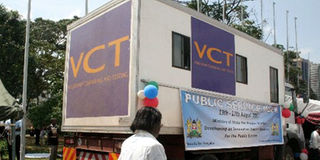Thousands wrongly diagnosed with HIV

A mobile VCT service at Nairobi KICC grounds. PHOTO/ FILE
What you need to know:
- Rapid tests fraught with errors as they are done once
Thousands of Kenyans and Ugandans may have been wrongly declared HIV positive, thanks to faulty tests at VCT centres, a new study suggests.
According to the study published in our sister paper, The EastAfrican, many others may have been incorrectly diagnosed as HIV negative.
The study involved 6,255 people aged between 18 and 60 who sought VCT services at a village in Masaka and the Kakira sugar plantations, in Uganda and a Coastal village in Kilifi and a slum in Kangemi estate in Nairobi.
The findings were published in the East African Medical Journal. The rapid tests — “Determine”, “Uni Gold” and “Capillus” — are normally used in poor societies as they are not expensive.
The report says the risk of misdiagnosis rises when they are done once without a confirmation test.
This is because they are “fraught with errors and as such, cannot alone be used to determine whether an individual is positive or not”.
The research, led by Prof Omu Anzala reveals that confirmatory tests are not usually done at VCT centres, which in most cases are manned by non-medical staff.
When two different tests were done on all the 6,255 people, 131 had “discrepant” results — where one is positive and the other negative.
On a third test, 27 were confirmed to be carrying the virus, meaning that without such controls and using just one test, 104 people could have been misdiagnosed as HIV positive.
Assistant Medical Services director Peter Cherutich says about 2.5 million people visit VCT centres every year.
Kenya has an estimated 1,000 independent VCT sites that screen about 800,000 people a year. A similar number is tested in government hospitals and another 700,000 after seeking treatment.
False results
Dr Cherutich admitted that a significant number of false results were being recorded because of the rapid tests, but said this was the best method for a country like Kenya.
“They are cheap and easy to use and do not require special conditions like refrigeration,” he said.
But Prof Anzala and his colleagues said HIV tests should always be administered with a confirmatory standard before one knows his status.




